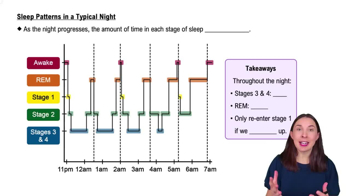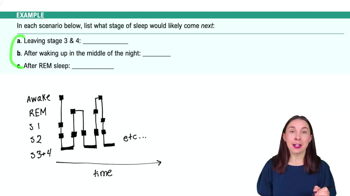Table of contents
- 1. Introduction to Psychology1h 43m
- 2. Psychology Research2h 20m
- 3. Biological Psychology2h 41m
- 4. Sensation and Perception28m
- 5. Consciousness and Sleep32m
- 6. Learning41m
- 7. Memory34m
- 8. Cognition37m
- 9. Emotion and Motivation35m
- 10. Developmental Psychology33m
- 11. Personality48m
- 12. Social Psychology41m
- 13. Stress and Health41m
- 14. Psychological Disorders44m
- 15. Treatment47m
5. Consciousness and Sleep
Sleep
Struggling with Psychology?
Join thousands of students who trust us to help them ace their exams!Watch the first videoMultiple Choice
Early in life, infants will demonstrate their personalities through their
A
temperaments.
B
telegraphic speech.
C
attachment.
D
assimilation.
 Verified step by step guidance
Verified step by step guidance1
Understand the concept of 'temperament' in psychology, which refers to the innate traits that influence how one thinks, behaves, and reacts with the environment. These traits are evident from early infancy and are considered to be biologically based.
Recognize that 'telegraphic speech' is a stage in language development where children use short and simple sentences, typically consisting of two words, to convey their thoughts. This is not related to personality demonstration.
Learn about 'attachment,' which is the emotional bond that develops between an infant and their primary caregiver. While attachment is crucial for social and emotional development, it is not a direct demonstration of personality.
Understand 'assimilation' as a cognitive process described by Piaget, where individuals integrate new information into existing schemas. This is more about cognitive development than personality.
Identify that 'temperament' is the correct term that describes how infants demonstrate their personalities early in life, as it encompasses the inherent traits that are observable from a young age.

 3:25m
3:25mWatch next
Master Circadian Rhythms with a bite sized video explanation from Hannah Gordils
Start learningRelated Videos
Related Practice


































































































![Race, Genes and IQ Differences | Bret Weinstein [Mini Clip]](https://img.youtube.com/vi/IztL_m3pd70/mqdefault.jpg)



































































































